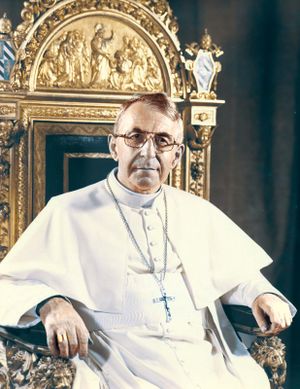More actions
No edit summary |
No edit summary |
||
| Line 1: | Line 1: | ||
{{ | {{Pont-Pontifexes(noncanonized)|title1=Konstantin IX|image1=Konstantin2.jpg|label1=The Pontifical Church|label2=17 November 3020|label4=Rokossovsky|label6=2985|label7=2987|label8=2995|label9=2968|label11=Rector St. Veronica Parish | ||
| | |||
|image1= | |||
| | |||
| | |||
| | |||
| | |||
| | |||
| | |||
| | |||
| | |||
Archpriest Archbasilica of Christ the Saviour | Archpriest Archbasilica of Christ the Saviour | ||
Apostolic Nuncio to Lancastria | Apostolic Nuncio to Lancastria | ||
Prefect for the Congregation for Religious Life | Prefect for the Congregation for Religious Life | ||
Cardinal Secretary of State | Cardinal Secretary of State|label12=Pontifical State University | ||
| | PSU St. George Seminary|label13=fac me vas virtutis tuae | ||
PSU St. George Seminary | "Make me an instrument of thy power."}}[[File:Konstantin2.jpg|thumb|'''Pontifex Konstantin IX''']]Pontifex Konstantin IX, born Vychaslav Reshevsky, is the 18th Pontifex of the Pontifical Church, and 310th Pontifex Maximus of the universal (Catholic) and apostolic Church, as well as the sovereign of the [[Pontifical States]]. Pontifex Konstantin was elected by the College of Cardinals in the [[The 19th Conclave|17th Conclave]] on November 17th, 3020. Before his election to the Pontificate, he served as auxiliary bishop in the Archdiocese of Ecclesia and Secretary of State under Pontifexes Vasiliev III and [[Pontifex Rokossovsky|Rokossovsky]]. | ||
| | |||
"Make me an instrument of thy power." | |||
}} | |||
[[File:Konstantin2.jpg|thumb|'''Pontifex Konstantin IX''']]Pontifex Konstantin IX, born Vychaslav Reshevsky, is the 18th Pontifex of the Pontifical Church, and 310th Pontifex Maximus of the universal (Catholic) and apostolic Church, as well as the sovereign of the [[Pontifical States]]. Pontifex Konstantin was elected by the College of Cardinals in the [[The 19th Conclave|17th Conclave]] on November 17th, 3020. Before his election to the Pontificate, he served as auxiliary bishop in the Archdiocese of Ecclesia and Secretary of State under Pontifexes Vasiliev III and [[Pontifex Rokossovsky|Rokossovsky]]. | |||
Revision as of 21:50, 23 August 2023

Pontifex Konstantin IX, born Vychaslav Reshevsky, is the 18th Pontifex of the Pontifical Church, and 310th Pontifex Maximus of the universal (Catholic) and apostolic Church, as well as the sovereign of the Pontifical States. Pontifex Konstantin was elected by the College of Cardinals in the 17th Conclave on November 17th, 3020. Before his election to the Pontificate, he served as auxiliary bishop in the Archdiocese of Ecclesia and Secretary of State under Pontifexes Vasiliev III and Rokossovsky.
During his years as Secretary of State Konstantin negotiated on behalf of Ecclesia in the peace talks following the NCR-Ecclesia Conflict, and negotiated the terms for Ecclesia to enter the Republik as the Thirteenth Prefecture. Under his leadership, the Ecclesian delegation negotiated an end to the country’s status as a tributary state and retained the Pontifical government’s full control over domestic affairs including widespread freedoms for Taurans within the state. In return the country ended a centuries long foreign policy of absolute political isolation by joining the Republik and ceding sovereign control of foreign affairs to the Republik Federal Government.
Since taking office as Pontifex, he has reformed the country into the Pontifical States (consisting of Ecclesia, Konstantingrad, and the Xel-Palmas), and declared independence following the collapse of the NCR in the NCR-IDO War. Konstantin has reversed several of the universalist policies of Pontifex Rokossovsky, but has made strong efforts to support Christendom throughout the Doggerlands. Most notably, he issued a decree to Rockfield citizens demanding the restoration of the Balancin Monarchy in a public referendum. On March 8 3021, Konstantin coronated Charles VI of Rockfield, restoring the Balancin Crown after 35 years of vacancy.
Konstantin was temporarily removed from power during the December Crisis of 3021. A coalition led by former Vicar-General Talbot Roberts and Vicar-General Yuri Lenkov abducted Konstantin and seized control of the Pontifical Government under the illusion of Konstantin’s incapacity to rule. The acting government under Lenkov was unseated by a military coup d'etat which claimed to hold power under the premise of returning Konstantin to office. Following a final clash between the Lancastrian Special Forces, the Protector-General Government forces under Vera Levedeva, and the Lenkov acting government forces, Konstantin was found to be illegally held from returning to office by the Protector-General. He was restored to power on January 22, 3022.
Following the December Crisis Konstantin remained out of the international scene, with the exception of calling the first Ecumenical Council of the Pontifical Church since the Second Council of Ecclesia in 2781. The Council of Lancastria, held at the Cathedral-Basilica of St. Michael the Archangel from August-September of 3022, reunited the Pontifical Church and the schismatic Rockfield Christian Church. The Rockfield Church, which had broken away following the Rockfield Succession Crisis, was reintegrated as the Rockfield Rite, a special sect of the Pontifical Church which recognizes the unique elements and heritage of the Church in Rockfield. The Rite is administered by the King of Rockfield in his capacity as a Legate of the Church.
Most recently, Pontifex Konstantin has issued a papal bull Quia Regnum et Potestas in which he supports and recognizes the independence of the Kingdom of Rockfield from the Republic of Wiltshire, and calls for individual members of the faith to act in support of the movement for independence.
